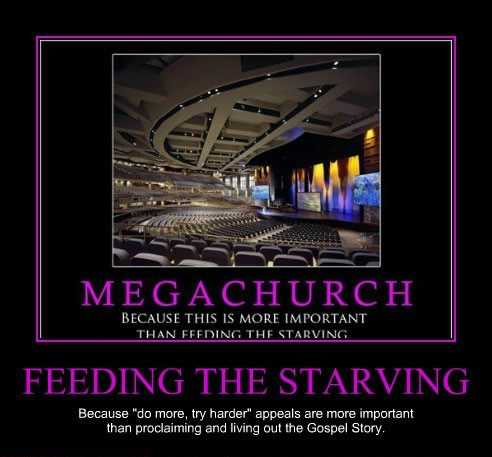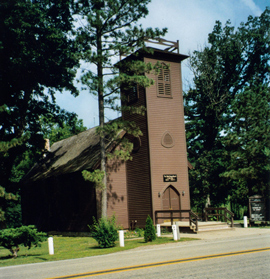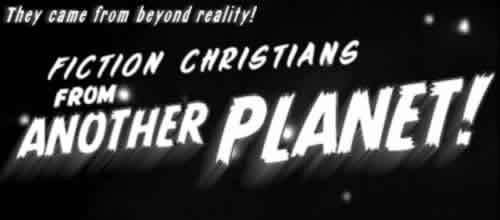Fiction Christians From Another Planet! IV: Terror Of The Megachurchians
Evangelical filmmakers who hope to break past the “be a better you” genre into one more profitable — subhuman effects-laden action blockbusters! — have I got a show for you:
EXT. IN THE VALE – AFTERNOON
Bland Hero arrives and GAZES with GRITTY DETERMINATION at a LITTLE BROWN CHURCH. Then a FLASHY SPONSORED SPORTS CAR arrives. Its door opens to reveal an ABSURDLY SEXPOT FEMALE CO-STAR.
BLAND:
That’s it. That is where They have hidden the Hard-to-Find-ium MacGillicuddy All-Spork Mystic Sword of Destiny and Simplistic Motivation.ABSURDLY:
Oh, Bland! Be careful.She bends over LOW, just because.
BLAND:
(with roguish smile)
It’s just a small building. What can possibly go wrong?SUDDENLY the camera lurches, and then our heroes. We pan UP, FAR UP to the distant tiny church, suddenly not so distant and NOT SO TINY. It leers up out of the earth, sod and rock crumbling about it, walls swelling, boards breaking out, Fellowship Centers turning to extra limbs, STEEPLE ELONGATING into a terrifying face with gleaming red stained-glass window slits for eyes. Tossing away several trees and cars for good measure, it roars into the sky:
CHURCH:
Come to meeee! I have childcare! I have coffeeee. I have uplifting messages! I have solutions to your marriage and career problems. Have felt needs? I will take care of them!BLAND and ABSURDLY scream and duck for cover.
CHURCH:
You are special! You have self-worth and value and purpose! You have a God-shaped hole in your heart that only I can fill!BLAND:
The legends were true! Run. Run! The Megachurchian Empire has awakened!
No, I’m not a fan of Megachurchians, at least not the ones that talk like that. In reality those monsters are at worst, heretical. In fiction they’re also annoying. And they’re one of the worst spawn of the extraterrestrial menace in focus during this adventure serial.
Yes, God has appointed some churches to stay small and some to grow large; He chooses some pastors to remain “obscure” yet faithful and others to face the challenges of fame and wider platforms. Here I mean only a religious mindset that emphasizes programs, uplifting messages, solutions to “felt needs,” affirming self-worth, and anything except the Gospel.
In reality, this is pathetic. Why reject the thrilling, life-changing, God-honoring, beautiful, and imagination-inspiring Story of Scripture in favor of plain “nonfiction” users’ manuals?
That’s just what the Megachurchian menace does. And it’s done this for a few decades. Yes, I’ve rehashed old real-life protests. But few identify this infection in fiction. In this realm, Megachurchianity assumes that characters are conformist life-forms who think like this:
Charis wanted to cry. Did Michael really mean it? Was he really saying there was a good God who loved everyone in the world — everyone, including her? But he could not mean that, she thought. After all, she was not important, beautiful, wealthy, or special. No one could love her after all the bad things she had done. Not even God.
— Original dialogue, based on that of a Christian contemporary/speculative novel
Once again you could be grumping in response to my grumping. C’mon, there are plenty of people who think like this, and it’s absurd to criticize such people as “conformist life-forms.” But that’s just it: there are only “plenty of people who think like this.” So some people don’t think like this. That’s reality, a reality too many (not all) Christian novels ignore. On the other planet from which these fiction Christians hail, the world is divided into easy groups:
- Childlike beings whose beliefs are limited to blind faith and voices from beyond.
- Wicked villains who are beyond redemption, despite the many chances they’ve had.
- Sympathetic people who don’t believe because of personal struggles or because they simply Haven’t Been Told. They never (horrors) know the Gospel and still reject it, showing that they don’t seek God (Rom. 3: 9-18) and are dead in sin (Eph. 2: 1-3).
Why do some authors think like this? Here are some possibilities, based on novels I’ve read:
1. It’s non-controversial.
In popular evangelicalism this is the default view. Critiquing it sounds nasty and unloving. Alas, despite his positives, even America’s most popular Christian pastor, Rick Warren, is known to focus mainly on people who fit “seeker-sensitive” manuals’ character profiles.
2. It comforts Christian readers.
Thinking that non-Christians may know the Gospel and still reject it, simply because they love their own darkness rather than God’s light (John 3:19), is a scary thought. We’d much prefer to assume better of our neighbors. That is a nice motive — but is it a Biblical one? Is it the best corrective to anti-Biblical judgmentalism? Does it really show love to others?
3. Popular Christian “nonfiction” implies this is how most pagans think.
 “Seeker-sensitive” manuals speak with one voice: non-Christians (at least the ones we care about) have “felt needs” for comfort, life and career help, and community. They don’t know Jesus because they’re ignorant, feel worthless, and have not heard about God’s love. Also someone (we don’t know who) has already told them of that whole nasty you-are-a-sinner part of the Gospel. Now we can be Good Cop and share only the story’s Good Parts Version!
“Seeker-sensitive” manuals speak with one voice: non-Christians (at least the ones we care about) have “felt needs” for comfort, life and career help, and community. They don’t know Jesus because they’re ignorant, feel worthless, and have not heard about God’s love. Also someone (we don’t know who) has already told them of that whole nasty you-are-a-sinner part of the Gospel. Now we can be Good Cop and share only the story’s Good Parts Version!
I can only say to fiction authors who’ve believed this propaganda: you need to get out more.
Starter solution
Yes, some pagans do think like Megachurchian seeker-friendly manuals say. But many do not. They hate God. They crave idols. They don’t fit Christians’ comfortable profiles.
So authors, wake up and acknowledge those kinds of people. How else can you love them? And how else can readers “meet” them in your stories, and wrestle with their refusals to conform to Megachurchian personality profiles? If we only ever “meet” pagan characters overcome by platitudes like “Really? There’s a God who loves — me?”, the author has gone beyond corny and into semi-digested corn. Worse, our Hero looks ridiculous, for in such stories we see only a sort-of Gospel that only works on sort-of people only in sort-of reality.












































Bravo. I agree with you completely, unequivocally. However, about ten years ago, I think I would have had to pause and think about what you are saying.
I love the picture of the megachurch and the saying. We have been taught that we have to bring them in and I wonder at what point are we catering to the building instead of the people, especially in older churches.
Anyway, I’m glad you posted your heart and your feelings about this.
And lots of pagans are perfectly nice people who are politely disinterested in Jesus. I’ve known Mormons and Wiccans who were as nice as the day is long. People are just people, not numbers. Even Jesus worked with a small, core group of 12. He only told stories to the multitudes and healed them–he didn’t preach doctrine unless they were in that core.
Agreed. That aligns with my point: that people are more complex, and have more-complex reasons for in effect hating God. It’s not simply that they have a Tragic Past, or Felt Needs, or don’t know how much God loves them no matter what they’ve done. Most people are so “nice” they’ve never done anything, so they don’t have that kind of sin-stigma one bit. Megachurchians thus offer them a cure for an illness they are certain they don’t even have.
Indeed, though as mentioned above, many Christian novels (particularly of the contemporary variety) treat non-Christians as either abject irredeemable villains or else the Megachurchian “unchurched” template representative.
Maybe I missed something, but I’m not sure how the Sermon on the Mount alone, not to mention Jesus’s overt discourse about His identity and heritage in the book of John (ending with His near-stoning), can be construed as anything other than direct proclamation of doctrine. (I agree that He saved the deep stuff for those who were already professing to follow Him — to the point of driving off some!)
Good article! There is definitely a need for wider diversity in the unsaved characters of Christian novels. Very few non-Christians conform to the stereotype you describe. They are either completely anti-God, or disinterested and don’t care, as Kessie pointed out. Before we are saved we are either rebelliously sinful, or complacently so. In fact, if somone recognizes what a horrible sinner they are, it’s probably because they already know there is a God “out there”! What would be the rationale for thinking, “I’m such a horrible, sinful person,” unless you already believed in a good God you had sinned against?
I have to admit, Stephen, I love abject irredeemable villains…especially when it comes time for their monologue(s).
But, this is fine work, as usual, on your part and a challenge not to be lazy with characters. Back at you, my friend…
As someone who has attended and worked in smaller, rural churches most of her life, I’ve continually been disappointed that nearly everyone in the Christian fic novels I’ve read attend large urban churches with ministries (and paid ministers!) for each demographic, strong finances, and no shortage of people coming. Not to mention everyone gets along very well, or if people to disagree it’s clearly a “good guy” versus “bad guy” story, with some evil hypocrite who the pious Christians need to overthrow (or something).
A lot of churches struggle just to cover the basics with a single pastor and volunteers, and people naturally have strong opinions when there’s a shortage of funds on where that money should be spent. People of faith disagree with each other, even in the same community or family (as Wesley of The Princess Bride said, anyone who says differently is selling something). How many novels are brave enough to show families divided over beliefs? I’ve never seen a single person in a Christian novel mention communion or baptism, which are the two most controversial creeds in Christianity. How do you have Christian characters discuss their beliefs with someone without every expressing an opinion on either subject?
Again, I would love to see a work where people have different beliefs, celebrate different customs, and are still able to possess good qualities that honor God in different ways. We could even start it like a joke: a Messianic Jew, a Jesuit priest, and a Holiness speaker-of-tongues walk into a space port and all attempt to convert the same alien tourist. Humor and conflict would be bound to come from that type of thing: after all, if there’s one thing that will bring out the worst in almost any Christian, it’s stepping on the other ones toes in front of a fresh mark. 😉
In many ways, I think the tendency of Christian spec-fic authors to oversimplify their non-Christian analog characters boils down to straight-up insecurity. If one’s frightened to admit to oneself that those who reject Christ’s claims can do so intellectually as well as emotionally, then it stands to reason that one’s stories end up populated by straw pagans. That sort of (perhaps subconscious) attempt to coddle the Lord God Almighty — to insulate His fictional followers from encounters with intelligent, contented, passionate nonbelievers — constitutes a vote of no-confidence in either the discernment of the reader or the bona fides of the God being coddled. The Maker of the universe doesn’t need our pathetic and transparent interference-running.
When Paul arrived in Athens, that citadel of paganism, did he skirt Mars Hill in search of the feeble stragglers of the Hellenistic herd, those who felt a “God-sized hole in their heart”? No. Instead, he boldly confronted the best and brightest the city had to offer, reasoning in the Areopagus itself. Neither his message nor his ministry was influenced by any personal insecurities against which he may have struggled. He didn’t feel it necessary to “make things easy” for the Gospel.
I think it’s possible that the Megachurchian Terror may be an unforeseen consequence of that plague of Blind Ones discussed in Part II of this series. If I choose to “just believe” God without subjecting His claims to any degree of logical scrutiny, it follows that I’ll fear that which I failed to confront when selecting my flavor of spirituality. To me, both rigorous reasoning and the convincing anti-Christian arguments which necessitate it will always remain enemies to be avoided lest either contaminate me with that most insidious of poisons: “human wisdom.”
But God doesn’t fear reason. He invites it because He created it. I believe Christian spec-fic writers have been granted a unique opportunity to confront the most confounding arguments posed by nonbelievers in a forum that doesn’t immediately turn them off: entertainment. And isn’t it true that one of the primary functions of science fiction and fantasy is to confront the scope and depth of cultural diversity? We Christian writers have got to strive for intellectual honesty as we explore our fictional worlds. We have nothing to lose from asking hard questions of our characters, and much to gain on this side of the looking-glass.
I wonder what the background of most Christian fiction writers is.
I know I would find it extremely difficult to write a non-Christian character, as I became a Christian as a child. So I have no first-hand knowledge of how an adult non-Christian thinks or feels.
What an excellent and enjoyable article. I must say, if you are looking for a work of fiction that directly deals with much of what you address here it is “And the Shofar Blew” by Francine Rivers. A very powerful work of fiction that focuses mostly on the tension of a dynamic young preacher (son of a mega-church pastor) committed to building and growing his small community church into what he believes to be the contemporary model of church. He does so very successfully, but at what cost? I remember being moved by the interwoven stories of the pastor, his wife, the elders, and members of the congregation and how the focus on church growth effected them all. It pulls no punches.
I highly recommend it.
[…] Last Thursday’s post reminded me of a great work of fiction I discovered several years ago by the incomparable Francine Rivers. No, it’s not Speculative Fiction, but And the Shofar Blew is a powerful and (dare I say) prophetic story for the church in America. […]
[…] in part to popular materials from invading megachurchians about being “seeker-friendly” and things like that, many Christians simply haven’t been […]
[…] in this blog series I noted novels’ issues with megachurchianity. Even that would not be so bad if novels included actual physical megachurches or people being […]
[…] touched on this in part 4 of a previous series, Fiction Christians From Another Planet! […]
[…] more about the problem of simplistic nonbeliever characters at Fiction Christians From Another Planet! IV: Terror Of The Megachurchians. […]